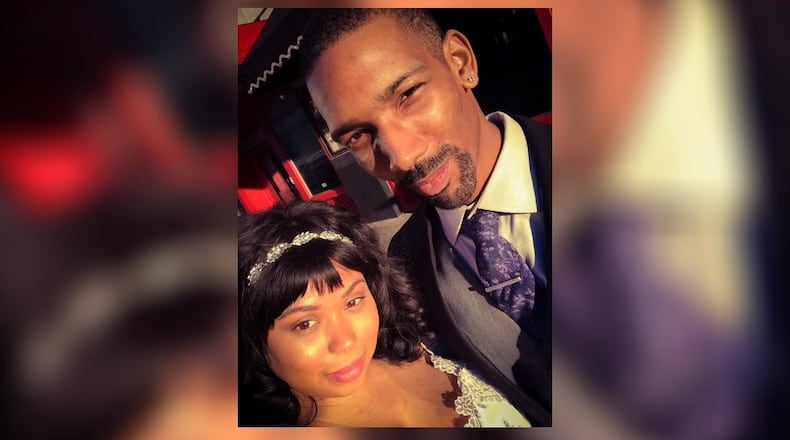On April 2, the attorney representing the driver’s family filed a notice of appeal to the Ohio Second District Court of Appeals.
On Jan. 26, 2022, 35-year-old Brandon Cooper was working as a Lyft driver when he accepted a ride from a profile named “Jimmy Smith” in Dayton
Around 2 a.m., Dayton police responded to the 1000 block of Ferguson Avenue after a vehicle’s OnStar reported a possible crash and found Cooper shot to death in the vehicle.
Four teens were arrested later that morning, including Da’Trayvon Mitchell and Tylan Peaks. While Mitchell and Peaks were 15 at the time of Cooper’s death, both were charged as adults.
Both were convicted of murder, with Mitchell sentenced to 25 years to life and Peaks sentenced to 27 years to life.
Cooper’s wife, Brittney Cooper, filed a wrongful death lawsuit against Lyft arguing the company was negligent and failed to protect drivers and passengers.
Wiseman said drivers are contractors for Lyft and the company does not have a legal duty to protect contractors from harm caused by third parties because Lyft does not actively participate in the contractors’ work.
While Lyft has general control over the app, it does not direct or control the specific activities of its drivers, the judge wrote.
Though the lawsuit stated Lyft could terminate or deactivate a driver’s account if their user rating fell below a certain criteria, Wiseman said the company’s terms of service said the driver will be given notice of potential deactivation as well as a chance to resolve the issue.
“Thus, the decision to terminate or deactivate a Lyft driver based upon the driver’s star rating or cancellation rate is not an automatic or unilateral decision made by Lyft, but is one that is subject to review and potential cure,” Wiseman wrote.
She also said the company cannot have exclusive control over all safety measures available on the app.
The lawsuit also claimed the Lyft did not implement effective and available safety measures, including verifying accounts using untraceable payment options.
Around 12:33 a.m. on Jan. 26, 2022, Mitchell reportedly created a Lyft account using the alias “Jimmy Smith” and a prepaid credit card.
Lyft sent a text message to the phone number associated with the account for Jimmy Smith with a passcode to verify the phone number.
The account requested its first ride at 12:48 a.m. with a pickup location in the 1900 block of Oakridge Drive, according to court records.
The ride was estimated to take approximately seven minutes. After around 10 minutes, Lyft’s Smart Trip Check-In reportedly sent an automatic message to the driver’s phone indicating the ride was taking longer than expected and the driver should contact Lyft if they needed assistance.
Wiseman noted there is a dispute between the parties as to if the driver responded to the check-in message.
However, at 1:26 a.m., Jimmy Smith was marked as having been dropped off by the driver, and the ride was listed as complete.
The account then requested another ride with the same pickup location. Brandon Cooper accepted the ride at 1:27 a.m., according to court records.
He picked the teens up at 1:47 a.m. Approximately 15 minutes later police responded to Brandon Cooper’s vehicle and found him shot to death.
Wiseman wrote that even if Lyft had a duty to protect users from unanticipated criminal activity, the company would not be liable from Brandon Cooper’s death because Peaks’ and Mitchell’s actions were not foreseeable.
The day before Brandon Cooper’s death a Lyft driver was robbed at gunpoint by Peaks and two other teens using the rider alias “J.D.”, according to court records.
That account had no known links to Jimmy Smith and used a different phone number, email address and pickup and drop off locations.
The driver reported that incident to Lyft around 9:04 p.m. on Jan. 25, 2022. A Lyft agent responded to the driver’s email at 1:47 a.m. Jan. 26, 2022, asking for additional information and the driver responded around 5:10 a.m.
“By the time of this interaction, Peaks and Mitchell had already murdered Brandon, approximately three hours earlier,” Wiseman wrote.
She also claimed Lyft had no way of knowing a driver who was carjacked right before Brandon Cooper was murdered no longer had her phone when she received the Smart Trip Check-In.
That driver did not report the carjacking until 10:25 a.m.
“Upon a review of the evidence, and in considering the totality of the circumstances, the court finds that Lyft could not have foreseen or reasonably anticipated Brandon’s tragic death; thus, even if Cooper had established the existence of a duty, Lyft cannot be held liable for negligence as a matter of law,” Wiseman wrote.
About the Author
